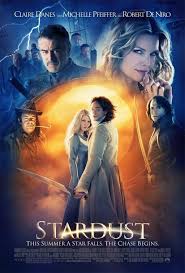 Elizabeth Vail penned this review.
Elizabeth Vail penned this review.
In this film, based on Neil Gaiman’s novel of the same name, Tristan (Charlie Cox), a young shop boy bedazzled by village belle Victoria (Sienna Miller), promises to find and recover a fallen star in return for her hand in marriage. Unbeknownst to him, said star, named Yvaine, looks an awful lot like a blond Claire Danes, and possesses a contrary personality to boot. On top of that, her descent to earth brings her to the attention of a trio of youth-seeking witches (headed by a wicked Michelle Pfeiffer) as well as a family of fratricidal princes eager to win their father’s crown.
Thankfully, Tristan gets to her first, but protecting the lovely celestial object and her immortality-bestowing heart from those who would harm her is a perilous quest in itself. Needless to say, it involves dazzling swordplay, magic spells, and unbelievable feats of derring-do. Surprisingly, hilarity also ensues.
While the humour in the original novel sprang from Neil Gaiman’s wry, sharply satirical narration, the film — a much more earnest and cheerful fantasy — relies fairly successfully on alternating moments of deadpan and spoof that refresh the straightforward quest tale and keep it from descending into a glitzy Lord of the Rings copy. Along with the witty back-and-forth dialogue between Tristan and Yvaine, the evil princes who don’t survive their brothers’ scheming provide a hilarious running commentary as helpless ghosts, and the witches will inspire cackling with their own sibling bickering.
Most of the cast ably rises to the occasion. Claire Danes sparkles (literally and metaphorically) as Yvaine, a lass who shows impressive spunk for a “plot coupon” and isn’t afraid to smack common sense into the epic-fantasy-addled Tristan. Charlie Cox plays Tristan fairly straight, but he provides a nice foil for the film’s numerous comedic aspects. Michelle Pfeiffer combines girlish vanity and menace with entertaining flair, and Sienna Miller and Rupert Everett (as murdered prince #2) perform capably with roles that are little better than extended cameos.
The only disappointment in the roster is Robert De Niro, who plays the closeted gay pirate Captain Shakespeare, who (perhaps in a subtle nod to Dread Pirate Roberts in The Princess Bride) is compelled to repress his campy hair-braiding, limp-wrist-flicking, cross-dressing impulses in order to maintain his fearsome pirate reputation. Unlike the rest of the cast who jump whole-heartedly into their roles, De Niro performs his with a desperate embarrassed squint, as if his casting were the result of losing a bet. Even when giving Tristan and Yvaine fashion tips, dancing around in a petticoat, and turning his famous mole into a heart with black eyeliner, he does it all with a lazy, stereotypical fabulousness that suggests he’s not trying very hard.
Otherwise, though, the film is a cheerful romp. Comparisons to The Princess Bride would not be entirely groundless, but the surreal buffoonery and eternally-quotable lines of that film are nigh-impossible to reproduce in a film this polished, market-researched, and well-financed. Rare for a fantasy-novel adaptation, the film succeeds as a stand-alone movie, that is, it has a well-paced, coherent, smooth-flowing narrative that never leaves the book-shy members of the audience feeling left out. Fans of the novel may be disappointed (although hardly surprised) to find that Gaiman’s bittersweet, laid-back fairytale has been translated into a more conventional, happier movie, but more conventional doesn’t equal entirely conventional, and this engagingly quirky movie is still guaranteed to entertain.
(Paramount, 2007)
